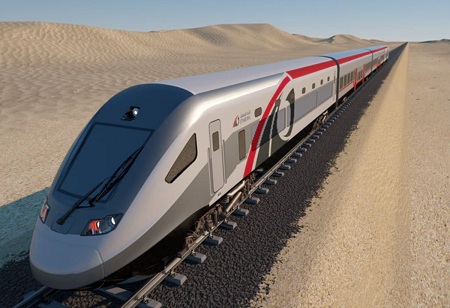
UAE-Oman rail network anticipated to bring about new era of collaboration and growth

 The UAE-Oman rail network is anticipated to usher in a new era of connectivity and economic expansion for Oman as well as aid the GCC in becoming a hub for global logistics. The sultanate has made clear that it intends to work even more closely with its GCC neighbours as it pursues its long-held goals of acting as a link between the East and the West.
The UAE-Oman rail network is anticipated to usher in a new era of connectivity and economic expansion for Oman as well as aid the GCC in becoming a hub for global logistics. The sultanate has made clear that it intends to work even more closely with its GCC neighbours as it pursues its long-held goals of acting as a link between the East and the West.
“Oman’s location in the Arabian Peninsula, plus its access to deep-sea ports overseeing the Indian Ocean outside of the choke point of Hormuz Strait, offers an almost perfect stop between the West and the East,” said Mahmood Al Wahaibi, managing partner at Oman Think Urban and infrastructure lead at the Oman National Spatial Strategy project.
When the Oman-Etihad Rail Corporation and Mubadala signed a $3 billion deal last month, work on the network's first phase is anticipated to begin. In order to establish the Oman-Etihad Rail Corporation and build a 303km rail route between Sohar and Abu Dhabi, Etihad Rail partnered with Oman Rail last year.
The sultanate unveiled its strategy for 2040 in 2014. As Oman develops into a logistics hub, the industry is expected to provide roughly 300,000 employment, according to the plan. Sohar and Al Ain will be connected by train in 47 minutes, while Sohar and Abu Dhabi will be connected in 1 hour and 40 minutes.
“The railway network will provide us with an alternate mode of transport, besides air and road travel,” said Sultan Al Balushi, a resident of Sohar.
“It will benefit people in both the UAE and Oman who are looking for a faster mode of transport at a more affordable price.
“I drive two or three times a month to the UAE for shopping and tourism, so once this rail is functional, I can also consider travelling by train.”
Several GCC citizens as well as Omani citizens have always been drawn to Sohar by its lush foliage and mountains. Among the various tourist attractions in or near the city are Sultan Qaboos Mosque and Sohar Fort.
As a result of the "novelty value in train travel," according to Aftab Patel, chief executive of Al Omaniya Financial Services and a longtime resident of the sultanate, the rail project will be advantageous for the tourism industry.
“Once Oman’s capital is connected with the network, it has the potential to increase tourism rapidly and benefit tourists in both countries,” he said.
Oman Rail told The National that the network would help to “shape a bright future for transport in Oman and the GCC”.
“The network is designed to effect deep social changes by seamlessly connecting urban centres with economic and industrial zones, creating jobs, developing the national human capital, stimulating regional tourism and kicking off a new age of innovation,” the rail operator said.
When complete, the rail network will connect all of the ports in the sultanate to Oman's GCC neighbours. According to Mr. Al Wahaibi, a new deal between the UAE and Sohar port gives both countries the opportunity to work together on the import and export of goods, including crude, while avoiding the Strait of Hormuz.
“This development may result in significant reductions in time and costs associated with these activities,” he said.
According to a Mercator analysis commissioned for Oman's logistics strategy for 2040, ship owners whose boats dock at Sohar port each week can save up to $10 million and 104 days a year by choosing to transfer their cargo further inland by rail. This might result in savings for ship owners that provide a variety of services of between $50 million and $100 million annually.
Adham Al Said, co-founder of The Firm for Business and Consulting and assistant professor of economics at Sultan Qaboos University, estimated that during the past ten years, the transportation sector's economic activity has contributed around 5% in real terms to the sultanate's gross domestic product.
“With new modes of transportation providing options for more commerce, linking existing industrial logistical hubs will be crucial to enhancing the value-added outcomes,” he said.
Oman's industries can reduce the cost of raw materials and finished items by using the rail network. The chairman of Sohar Aluminium, Ayad Al Balushi, stated that transportation costs were important to the cost of the company's goods, particularly the final price paid by the client.
“At Sohar Aluminium, with exports being a large part of our business, reducing transport costs is of paramount importance. It will provide us with a competitive edge over other market players worldwide,” Mr Al Balushi said.
There are numerous export-oriented businesses in Sohar. According to Mr. Al Balushi, the industries in Sohar are more competitive because they can reach their consumers faster and for less money thanks to a well-connected logistics sector.
“The more connected we are, the better we can position ourselves as a region,” he said.

